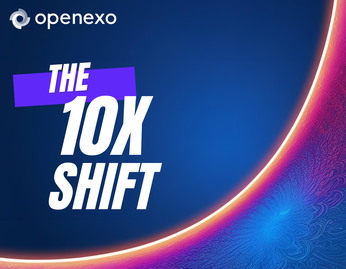
Leveraging Community and Crowd for Exponential Business Growth
Harnessing community and crowd can drive exponential business growth. Ethereum's crowdfunding success and cases like GoFundMe illustrate this power. Learn how to balance community engagement with company goals to unlock your organization's potential.
In today's fast-paced business landscape, the key to achieving exponential growth often lies in tapping into non-traditional assets: the power of community and crowd. These resources are not just buzzwords; they are crucial drivers of innovation and operational success in the exponential economy. Let's explore how organizations can harness these assets to transform their business models and achieve unprecedented growth.
The essence of exponential organizations is their ability to leverage the voluntary expertise and talent of the community and crowd. Unlike traditional employment models, these resources provide a vast pool of cognitive talent that can be accessed without the constraints of contracts or paychecks. As highlighted in "Exponential Organizations," a pivotal question emerges: "Are you primarily a community or are you primarily a company? The reason you have to ask yourself this is because sooner or later the two will come in conflict." This quote underscores the potential tension between these two identities, yet emphasizes the necessity of embracing the power of community and crowd to thrive in the new economic landscape.
Ethereum: A Case Study in Crowd Power
Ethereum stands as a compelling example of how the crowd can revolutionize financial systems and crowdfunding. Launched in 2015, Ethereum is the second-largest blockchain cryptocurrency by market capitalization. It was crowdfunded and designed to be decentralized and open, enabling the development of a vast array of decentralized finance (DeFi) applications and non-fungible tokens (NFTs). Ethereum's model showcases the crowd's ability to foster a decentralized ecosystem, with the Ethereum Foundation itself developed through a 2014 public crowd sale where investors bought Ethereum value tokens with Bitcoin. The DAO (decentralized autonomous organization) on Ethereum raised a record $150 million through a crowd sale in 2016, demonstrating the transformative potential of crowdsourcing in finance.
Success Stories: Community-Driven Companies
The success of community-driven companies across various sectors further illustrates the power of this approach. From tech giants like Apple and Amazon to innovative platforms like Axie Infinity and Kaggle, these companies harness community engagement to drive their business models. Apple's loyal community of customers and reviewers, Axie Infinity's play-to-earn model using Ethereum-based cryptocurrencies and NFTs, and Roblox's platform where community members co-develop and launch video games all highlight how different industries can leverage community to foster innovation, customer loyalty, and global reach. GitHub, powered by a community of developers, and LinkedIn, with its 880 million members, demonstrate the power of community in software development and professional networking. During the COVID-19 lockdowns, Peloton grew to be the largest fitness platform with over 1.4 million members, while Fitbit's 29 million community members use its wearable devices across more than 100 countries. Reddit hosts 130,000 different communities, seeing 20 billion visits per year from 430 million users. Open-source software (FOSS) has been community-driven since the late 1980s, and Amazon uses crowd insights for product development. Stack Overflow rewards community members with a Karma-based point system, and XPRIZE engages a global community of innovators in incentive-prize challenges, such as the $100 million carbon removal competition funded by Elon Musk in 2021 and the $11 million Wildfire XPRIZE in 2023.
The Growing Power of the Crowd
The influence of the crowd is amplified by advancements in global connectivity. The deployment of 5G, increasing from 13 million connections in 2019 to an expected 2.8 billion by 2025, and low-Earth orbiting constellations like Starlink, enable organizations to tap into billions of potential participants. The upcoming development of 6G technology, promising speeds 100 times faster than 5G and capable of handling 142 hours of Netflix content in one second, will further revolutionize connectivity. Organizations implementing Exponential Organization principles have seen remarkable results, achieving 6.8x higher profitability, 40x higher shareholder returns, 11.7x better asset turnover, and 2.6x better revenue growth.
Case Studies: Harnessing the Crowd's Potential
GoFundMe, TaskRabbit, TikTok, Kiva, and Wikipedia are prime examples of how Exponential Organizations effectively utilize crowds to drive their business models. GoFundMe raised nearly $10 billion from over 120 million donors between 2010 and 2020 with only 500 employees. TaskRabbit connects consumers with 60,000 freelancers for everyday tasks, acquired by IKEA in 2017. TikTok achieved 2 billion downloads by 2020 and became the world's most popular website by 2021, with content created autonomously by users. Kiva, the first online lending platform connecting lenders to entrepreneurs globally, focuses on financial access for underserved communities. Wikipedia averages over 18 billion page views per month, adds 20,000 new articles each month, and has 27 million registered users. These case studies highlight the transformative potential of crowds in modern business.
Balancing Community and Company
Organizations can balance being both a community and a company by establishing clear values and missions that align the interests of both. They should foster an environment where community input is valued but also maintain a structured business model that ensures operational efficiency and profitability.
Strategies for Engaging and Managing Community and Crowd
Effective strategies include creating engaging platforms for interaction, incentivizing participation through rewards or recognition, and using data analytics to understand and respond to community needs. Transparency and regular communication also help in maintaining trust and engagement.
Comparing Ethereum's Decentralized Finance to Traditional Systems
Ethereum's model of decentralized finance operates without intermediaries, offering greater autonomy and accessibility to users compared to traditional financial systems, which rely on banks and financial institutions to facilitate transactions.
Future Implications of Ethereum's Crowdfunding Model
Ethereum's crowdfunding model could inspire other industries to adopt decentralized funding mechanisms, potentially leading to more inclusive and democratic approaches to raising capital and engaging stakeholders.
Emulating Community Engagement Strategies of Larger Corporations
Smaller companies can emulate these strategies by focusing on niche communities, leveraging social media for engagement, and offering unique value propositions that encourage community participation and loyalty.
Risks and Rewards of Crowd-Based Business Models
The rewards include increased innovation, customer loyalty, and scalability, but the risks involve potential loss of control, dependency on community goodwill, and the challenge of managing diverse opinions and expectations.
Preparing for the Transition to 6G
Organizations can prepare by investing in research and development focused on 6G applications, collaborating with technology partners, and training their workforce on emerging technologies to stay ahead of the curve.
Implications of Global Connectivity for Crowd-Based Models
Global connectivity expands the reach of crowd-based business models, allowing for greater participation and diversity of input, which can drive innovation and scalability but also requires robust digital infrastructure and cybersecurity measures.
Measuring the Success of Crowd-Based Initiatives
Success can be measured through metrics such as user engagement, growth in participant numbers, quality and quantity of contributions, and the impact on business outcomes like revenue or product development.
Challenges in Transitioning to Crowd-Based Models
Challenges include managing large and diverse crowds, ensuring quality control, maintaining engagement, and integrating crowd contributions into existing business processes without disrupting operations.
Key Takeaways
- Exponential growth is driven by leveraging non-traditional assets like community and crowd.
- Ethereum exemplifies the transformative power of the crowd in decentralized finance and crowdfunding.
- Successful companies across various sectors harness community engagement to drive innovation and loyalty.
- Advancements in global connectivity, such as 5G and the forthcoming 6G, will further empower crowd-based business models.
- Organizations must balance being a community and a company to avoid conflict and maximize benefits.
Embrace the power of community and crowd to redefine your organization's potential. Explore the concepts of Exponential Organizations further and take proactive steps towards implementing these strategies in your organization to unlock your exponential potential.
ExO Insight Newsletter
Join the newsletter to receive the latest updates in your inbox.









